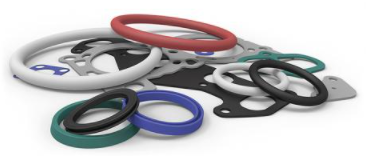Custom rubber seals

Achieving an impervious connection means carefully selecting the right rubber seal according to the application and, in some cases, designing a custom part. Here are the important considerations when designing a custom seal...
In many cases, manufacturers can opt for a standard, off-the-shelf seal. As well as being readily available, these products are certified to ISO 3601 standards and come with relatively low lead times and upfront costs.
However, exceptionally demanding or aggressive environments may require a bespoke option built from specialist materials that can withstand increased demands on temperature stability, chemical resistance or other factors.
HIGH TEMPERATURE RESISTANCE
When exposed to environments close to or beyond the recommended operating temperature, rubber seals and O-Rings can degrade and risk becoming non-functional. Excessive heat can lead to both swelling and hardening of the material, resulting in permanent deformation. Meanwhile, extreme cold temperatures can result in elastomer seal becoming harder and more brittle.
Many standard materials offer wide temperature ranges. For example, Nitrile rubber (NBR) can operate in environments ranging from -40°C to 108°C, and is resistant to oil, gas and petroleum-based hydraulic fluids. However, AFLAS is more widely used in the oil and gas market because of its ability to withstand temperatures of up to 250°C. Another material with a wide temperature range is Viton (FKM/PPM), a fluoropolymer elastomer and hydrocarbon rubber with a working temperature range of -20°C and 205°C depending on the grade.
CHEMICAL RESISTANCE
When exposed to hydrogen sulfide (H2S), a possibility in oil, gas nd petrochemical facilities, non-resistant elastomers become hard and brittle, losing their elastic properties and ability to seal effectively. Meanwhile, in wastewater treatment plants, H2S and methane can cause rubber to soften, swell, crack and become brittle.
Once again, AFLAS is a strong contender for these facilities because of its high resistance to acids, amines, bases and steam. Another option is seals made from perfluoroelastomer (FFKM/FFPM), as this material can resist chemicals including concentrated nitric acid, sodium hydroxide, ethylene diamine and steam
OTHER CONSIDERATIONS
In water filtration systems, for instance, seals must be water resistant to avoid degradation due to oxidation. Usually, we’d recommend using EPDM rubber because, as a synthetic rubber comprised of ethylene, propylene and diene, it boasts excellent waterproofing properties. Meanwhile, if the seal will be exposed to external pressure and regularly stretched, a material with good tensile strength is required. Polyurethane materials would offer a better solution than most rubber alternatives for these applications because of their superior tensile strength and ability to withstand abrasion and wear.
With certain high-end polymers, demand outstripping supply has meant long lead times. However, by working with an experience seal and O-Ring specialist, manufacturers can access comparable perfluoroelastomers with better lead times and at reduced price.
TFC recently acquired Manchester-based EAP Seals, which means customers can now benefit from a seamless experience when ordering seals, springs, retaining rings or when streamlining their supply chain with TFC Vendor Managed Inventory (VMI).
1.The news above mentioned with detailed source are from internet.We are trying our best to assure they are accurate ,timely and safe so as to let bearing users and sellers read more related info.However, it doesn't mean we agree with any point of view referred in above contents and we are not responsible for the authenticity. If you want to publish the news,please note the source and you will be legally responsible for the news published.
2.All news edited and translated by us are specially noted the source"CBCC".
3.For investors,please be cautious for all news.We don't bear any damage brought by late and inaccurate news.
4.If the news we published involves copyright of yours,just let us know.
BRIEF INTRODUCTION
Cnbearing is the No.1 bearing inquiry system and information service in China, dedicated to helping all bearing users and sellers throughout the world.
Cnbearing is supported by China National Bearing Industry Association, whose operation online is charged by China Bearing Unisun Tech. Co., Ltd.
China Bearing Unisun Tech. Co., Ltd owns all the rights. Since 2000, over 3,000 companies have been registered and enjoyed the company' s complete skillful service, which ranking many aspects in bearing industry at home and abroad with the most authority practical devices in China.




